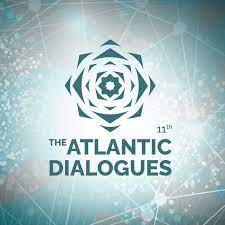Morocco’s Africa policy stimulated the interest of participants as Marrakech hosted the 11th edition of the Atlantic Dialogues Conference.
Special correspondent, Lemine Ould M. Salem
It was Friday, December 16, at the Mamounia, the famous palace of Morocco’s touristic capital Marrakech.
Jamil Mahuad, former president of Ecuador, was participating in the Atlantic Dialogues, a high-level conference that since 2012 has brought together hundreds of African and foreign politicians, diplomats, bankers, academics and influential people around the very active Moroccan think-tank the Policy Center for the New South (PCNS).
That day, the Latin American statesman was preparing to give an interview to Moroccan television when he suddenly asked for “a few seconds” to speak to his assistant.
The former Ecuadorian president told his assistant to trace the African journalist he had talked to a few minutes earlier at the other end of the large luxury hotel.
When the reporter introduced himself, Jamil Mahuad asked him, with evidently unfeigned curiosity, if he could effect a reversal of roles by questioning him in turn.
“As an African, can you tell me which countries could be leaders on the continent, should our countries want to engage in a possible partnership with Africa?” asked the former Ecuadorian leader, who had come to Marrakech with two other former heads of state from his region.
They were Jorge Tuto Quiroga of Bolivia and Argentine’s Federico Ramon Puerta.
“The question is legitimate,” acknowledged Ade Mabogunje, a Nigerian researcher at Stanford University in the United States, who deplored “the fact that the countries that have the potential to play the role of spokespersons for Africa have not yet shown enough willingness to assume that role.”
Strong
leaders
For this man who is used to the Atlantic Dialogues, “Africa has everything to gain in its relations with the rest of the world by organizing itself around countries that are politically stable, economically dynamic and diplomatically credible,” referring to countries such as South Africa, Nigeria, Egypt and Morocco.
“Like everywhere else, Africa needs strong leaders. But leadership cannot be decreed. It is built naturally,” says Khalid Chegraoui, one of the driving forces behind the PCNS, currently a professor at the latest of Morocco’s top schools, the Mohamed VI Polytechnic University in Rabat.
Is he thinking about his country which, since the arrival on the throne of King Mohamed VI in 1999, has multiplied its involvement in African countries?
In 20 years of reign, the successor of Hassan II has made nearly 50 visits to Africa. Under his leadership, more than a thousand agreements have been signed between Morocco and dozens of African countries, compared to only a few 500 between 1957, the date of the kingdom’s independence, and 1999, the year of his enthronement.
Meanwhile, dozens of private Moroccan companies have rushed south of the Sahara.
Since the arrival in power of Mohamed VI, Rabat has also increased her diplomatic offensives through the opening of new Moroccan representations in countries previously ignored, in addition to the mobilization of religious links historically linked to the kingdom, such as the Sufi brotherhoods established throughout southern Sahara.
“It is difficult to say that Morocco has discovered an African vocation. Actually, this vocation has never left it. It is equally difficult to dispute a renewed Moroccan interest in Africa, as evidenced by the return of Rabat to the African Union in 2017, 34 years after leaving the Organization of African Unity (OAU, now AU) in 1984 against the backdrop of differences with some countries on the Sahara issue” Khalid Chegraoui observes.
”But it is not easy to say that the kingdom has the ambition to play a leadership role on the continent, especially since officials have always been very cautious on this issue, with the king at the head,” insists the man who was for a long time the director of the Institute of African Studies at Mohamed V University in Rabat, the Moroccan answer to France’s prestigious Sorbonne University.
By way of argument, the academic recalls the speech of the Moroccan monarch marking the return of his country to the African Union (AU) during a summit held in January 2017 at the headquarters of the pan-African organization in Addis Ababa, Ethiopia.
“Some argue that Morocco would aim to acquire leadership in Africa. I answer them that it is to Africa that Morocco seeks to give leadership,” the Moroccan head of state had then insisted before his African peers.
“It is Africa that Morocco seeks to give leadership to”
“No African leader or country wants to openly address this issue of leadership. The states that can afford it have to pull the others up. In southern Africa, no one can dispute that South Africa is the leading country. In West Africa, it is Nigeria. In East Africa, it’s Egypt. Why not Morocco in North Africa and even elsewhere, especially since the country has an outstanding asset that allows it to inscribe its policies in the long term with the existence of a perennial monarchy?”, argues Abdoullah Coulibaly, president of the Bamako Forum, the most consistent annual political and intellectual meeting in West Africa for the past twenty years.
“African countries have everything to gain from examples like Morocco and its way of building its influence, its soft power, in Africa and elsewhere,” this leading figure in Malian civil society goes on.
“Given its naturally strategic geographical position between Africa and the other countries of the Atlantic rim of Europe or America, is it not a good thing that Morocco assumes a role of African leader?”, Jamil Mahuad asks, slipping away into the colorful corridors of La Mamounia, surrounded by his two South American colleagues who seem to identify themselves with the questions of the former Ecuadorian president.
LOS/fss/as/APA


